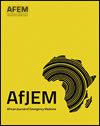世卫组织/红十字国际委员会基本急救课程对南非豪登省初级保健设施护士的知识、信心和能力的影响
IF 1.2
4区 医学
Q3 EMERGENCY MEDICINE
引用次数: 0
摘要
初级卫生保健(PHC)护士负责预防保健和紧急情况,尽管后者不是她们的重点。提高基本急救技能至关重要,因为初级保健设施是第一护理点。世界卫生组织和红十字国际委员会制定了基本急诊护理课程,但尚不清楚该课程是否适合豪登省初级保健护理人员。本研究评估了BEC课程对豪登省选定的初级保健机构的护士在急诊护理方面的知识、信心和能力的影响。方法采用干预前-干预后设计,对来自3个急诊科的86名完成BEC课程的护士进行有目的抽样。数据收集发生在2024年4月至6月。知识、信心和能力通过课前和课后的调查和知识测试进行评估,再加上6个开放式问题的最终评估。数据分析包括描述性统计、相关分析和推断方法,以确定观察到的变化的统计显著性。结果共纳入各类护士86名。知识得分由测前的55.1%显著提高到测后的78.8%。课程结束后,自我认知能力和自信心由2.72提高到3.54。方差分析显示护士类别与测试前(p = 0.004)和测试后(p <;0.001)。测试后置信度在不同类别之间也有显著差异(p = 0.046)。开放式回答的内容分析确定了四个主题:“纠正错误”、“课程极其拥挤”、“上下文相关性”和“技能更新”。讨论结果显示,所有接受BEC培训的护士都获得了显著的知识收获。然而,护士类别之间的表现差异表明需要进一步探索和考虑如何适应不同类别的护士。虽然护士认为课程非常有用和相关,但应考虑内容负载和课程时间。本文章由计算机程序翻译,如有差异,请以英文原文为准。
Impact of the WHO/ICRC Basic Emergency Care (BEC) course on nurses’ knowledge, confidence, and competence in Primary Health Care facilities in Gauteng, South Africa
Introduction
Primary health care (PHC) nurses handle preventative care and emergencies, despite the latter not being their focus. Upskilling in basic emergency care is essential as PHC facilities serve as the first point of care. The World Health Organization and International Committee of the Red Cross developed a Basic Emergency Care (BEC) course, but its suitability for Gauteng PHC nursing staff remains unknown. This study assessed the BEC course's impact on nurses' knowledge, confidence, and competence in emergency care at selected Gauteng PHC facilities.
Methods
A pre-post intervention design was used with purposive sampling of eighty-six nurses who completed the BEC course from three emergency departments. Data collection occurred April-June 2024. Knowledge, confidence and competence were assessed using pre- and post-course surveys and knowledge tests, plus a final evaluation with 6 open-ended questions. Data analysis included descriptive statistics, correlational analyses, and inferential methods to determine statistical significance of observed variations.
Results
The study included N = 86 nurses across various categories. Knowledge scores significantly increased from 55.1% pre-test to 78.8% post-test. Self-perceived competence and confidence improved from 2.72 to 3.54 post-course. ANOVA revealed significant relationships between nurse categories and scores in pre-tests (p = 0.004) and post-tests (p < 0.001). Post-test confidence also varied significantly between categories (p = 0.046). Content analysis of open-ended responses identified four themes: "Correcting wrongs", "Extremely congested course", "Contextual relevance" and "Skills update."
Discussion
The results highlight significant knowledge gains for all nurses who received BEC training. However, differences in performance between nurse categories suggest a need for further exploration and consideration of how to accommodate different categories of nurses. While nurses found the course highly useful and relevant, content loading and course duration should be considered.
求助全文
通过发布文献求助,成功后即可免费获取论文全文。
去求助
来源期刊

African Journal of Emergency Medicine
EMERGENCY MEDICINE-
CiteScore
2.40
自引率
7.70%
发文量
78
审稿时长
85 days
 求助内容:
求助内容: 应助结果提醒方式:
应助结果提醒方式:


